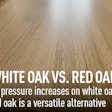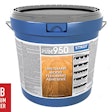How many times have you seen a company displaying an FSC logo on their website but when you called, were told that FSC material was available only as a special order, or not in the product or size or species or grade you wanted? How many times has a company noted a product was "certified" with some form of gold (or green!) star, but when you asked what that meant, no one could tell you? Or you found that the certification didn't really mean that anything was really different from all the other (non-certified) products commonly available?
Or perhaps you see a company with lots of association logos on their website-they are members of three, five, 10 different organizations…does that mean that they are better than a company that doesn't belong to any?
Certainly "Greenwashing with Logos" is a real problem today. We're overwhelmed with logos and labels and "certifications" that confuse, rather than help, the consumer. According to an article in the Washington Post, a 2009 survey identified approximately 600 labels worldwide that indicate some type of "environmentally friendly" attribute. They listed 36 related to forest products and 64 connected to the building industry.
What can you do? It comes down to educating yourself. If you see a logo, research the claims behind it. (Ideally, a company should have a fast link from the logo on their site to the certifying body that licenses the logo.) You might even check to see if it's still true-once in a while a company might have a certification or membership listed that has been lost or dropped or worse, doesn't even belong to them.
See if the certifications or memberships are relevant to that product and to your requirements for that product. Sometimes the described/certified attribute is not that important. Sometimes it's a common attribute that is actually an industry standard. Or it could be a publicly available standard, not something that really goes beyond the norm. A good list of issues to consider can be found at the Sins of Greenwashing site. (We'll do more on those next week.)
Ask the company about the certifications they are claiming-find out what they mean and make sure that the company understands them as well. Ask how does THAT certification imply a better or "greener" condition then a similar, non-certified or differently certified product? Ask which products meeting those standards are actually stocked regularly or if everything is special order.
If a company lists a lot of association memberships on its site, ask how involved they are with them. Do they participate on committees, attend conventions, take offered courses, agree to follow specific codes of conduct? Being a member is very different from being an involved member and simple membership does not imply an endorsement from that association.
Finally, ask about the company's green policy-hopefully it's readily available on their website, and, if not, find out if they even have one. See what they do beyond the certifications and associations-check their community involvement and their corporate policies. Being "green" goes beyond logos, but since many companies sometimes do greenwash with logos, it's up to the buyer to dig a bit deeper and see how deep the commitment goes.
































